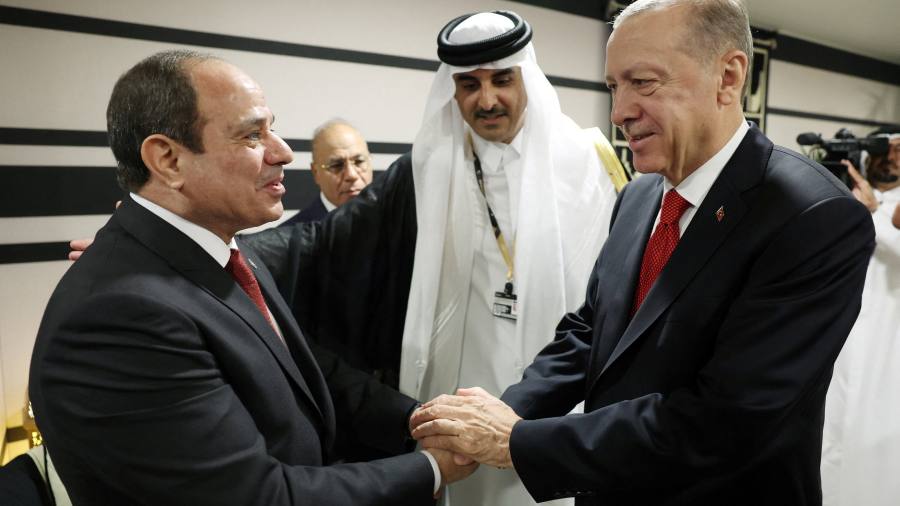Receive free Middle Eastern politics & society updates
We’ll send you a myFT Daily Digest email rounding up the latest Middle Eastern politics & society news every morning.
Turkey and Egypt have appointed ambassadors to each other’s capitals for the first time in a decade as the countries repair relations that were shattered when a democratically elected Islamist government in Cairo was ousted in a 2013 military coup.
The decision, which came after an agreement between Turkish president Recep Tayyip Erdoğan and his Egyptian counterpart Abdel Fattah al-Sisi, is the latest indication that former regional foes are seeking to mend ties as they focus on their domestic economies.
“This step aims at the re-normalisation of relations between the two countries and reflects the mutual will to develop bilateral relations in line with the interests of the Turkish and Egyptian peoples,” a joint statement between Turkey and Egypt said.
Ankara and Cairo broke off diplomatic relations in 2013 after Erdoğan condemned the popularly backed coup led by Sisi that ousted Mohamed Morsi, an Islamist and the country’s first democratically elected president.
Erdoğan, whose rise was also rooted in Islamist politics, strongly backed Morsi’s Muslim Brotherhood. In the intervening years, Turkey had served as a haven for members of the group as Sisi’s regime launched a sweeping crackdown against the Islamist movement and its supporters.
The two countries re-established consultations between foreign ministries in 2021, and late last year Erdoğan and Sisi shook hands at the football World Cup in Qatar. Turkey has made several concessions to Egypt, including a move to push television stations, including those set up by opponents of the Sisi regime, to tone down their criticism of the Egyptian government.
Egypt and Turkey have retained strong trade ties despite the diplomatic rift: Egypt was among the top-20 markets for Turkish exports last year, according to the Turkish Statistical Institute.
The reconciliation with Egypt, which has been a gradual process over the past two years, is also part of a wider healing of rifts in the region. Support for the Muslim Brotherhood has been a main cause of strained relations between Egypt, Bahrain, the UAE and Saudi Arabia on one side and Qatar and Turkey on the other. Saudi Arabia, the UAE, Egypt and Bahrain cut off diplomatic and transport links with Qatar after imposing a regional embargo on the small gas producer in 2017. The ban was lifted in 2021, which led to a thawing of tensions in the region.
Ankara has also sought to improve its relations with several other countries in the region in recent years as Erdoğan has looked to the Gulf for funding at a time when western investors have abandoned the country’s markets and Turkey has fallen deeper into economic malaise.
Erdoğan is to travel to the UAE later this month, Turkish finance minister Mehmet Şimşek said on Monday. Şimşek and vice-president Cevdet Yılmaz, who are leading an effort to quell Turkey’s years-long economic crisis, visited Abu Dhabi in June, with Turkey hoping to secure fresh investment from the oil-rich state. Abu Dhabi had already promised in 2021 to invest $10bn in Turkey after UAE president Sheikh Mohammed bin Zayed al-Nahyan met with Erdoğan in Ankara.
Turkey also last year sought to ease tensions with Saudi Arabia, which deteriorated sharply after Saudi agents murdered journalist Jamal Khashoggi in the kingdom’s consulate in Istanbul in 2018. Ankara also restored embassy-level relations with Israel in 2022 as part of its push towards rapprochement with other regional powers.
Read the full article here





